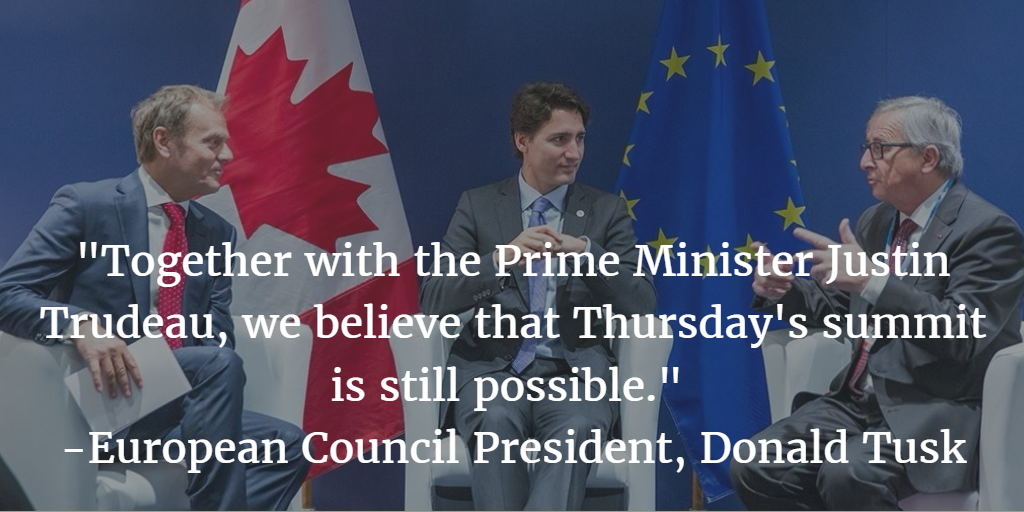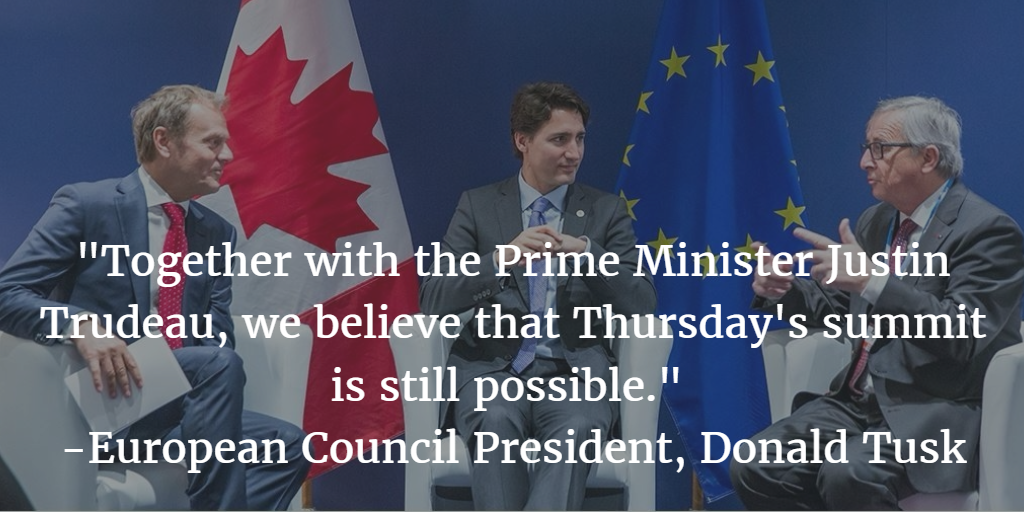
In Focus – EconoGraphics
The Comprehensive Economic & Trade Agreement (CETA):
Why “Comprehensive” MattersOn October 14, the regional parliament of Wallonia, a French-speaking region of 3.6 million people in Belgium, voted to block the CETA which has been negotiated between Canada and the European Union for over 7 years.
Historically, the European Commission had the responsibility to negotiate trade deals and the European Parliament would act as the single, ratifying authority for the deal once complete. This article from the Financial Times provides an interesting analysis on why the European Commission changed this policy for CETA and how this change may undermine future trade agreements.
Due to the different way in which CETA is voted on, the future of CETA hinges on support from the Belgian region Wallonia. At the end of last week, the European Union issued an ultimatum urging Wallonia to end its objection to the agreement before Monday. Wallonia insisted they would be unable to agree on CETA by the deadline, thereby rejecting the ultimatum.
Despite the contention facing CETA, the Belgian government believes that the trade deal is progressing. Further, European Council president Donald Tusk remains adamant that a CETA signing summit is still possible for Thursday, October 27.

Speeches & Announcements
TTIP Part of the European Commission’s 2017 Work Program
“Given the common values of the EU and the United States, as well as the strategic, political, and economic importance of the transatlantic relationship, the Commission stands ready to conclude an ambitious, balanced and high-standards Trade and Investment Partnership Agreement.”
On October 25 in Strasbourg, the EU Commission met to discuss the Commission’s work program for 2017. It sets out the key initiatives that the EU Commission plans to deliver by the end of 2017. Among the deliverables, the EU Commission believes in negotiating free trade agreements including TTIP. As indicated, the EU Commission is ready to conclude TTIP because of its strategic, political, and economic importance for the transatlantic relationship. (European Commission)
News
15th Round of TTIP Negotiations Official Report
Trade negotiators from the European Union and United States met in New York City from October 3-7 for the 15th round of TTIP negotiations. In keeping with the European Commission’s efforts to increase transparency within the
Trade for All strategy, the European Commission has published
this report of the negotiations which outlines the various areas of the trade deal that progressed during the 15th round of negotiations. Of note is the significant progress made on a new article that refers to areas of TTIP that are of particular importance to small and medium-sized enterprises. (
European Commission)
Obama to Visit Berlin, Discuss TTIP
The White House has announced that US President Barack Obama will be travelling to Berlin November 16, the President’s final trip to Germany before he leaves office in early 2017. During President Obama’s trip to Berlin, he will meet with German Chancellor Angela Merkel as well as leaders of Italy, France, and the United Kingdom. TTIP, along with the ongoing conflicts in Syria and Ukraine, will likely be the focus of discussions. (
The White House)
TTIP Action Partners
Would you like to hear how you can partner with the Atlantic Council and our trade work? Click here and learn more!
Recent Analysis
Why We Should Persevere with TTIP
The
Institut Montaigne, an independent French think tank, published
this report outlining the benefits of TTIP, strongly supporting the continuation of TTIP negotiations. The report explains that passing TTIP is in the best interests of European countries as the reduction of tariff and non-tariff barriers to trade would strengthen the competitiveness of the European economy, increase exports, and contribute to the economic recovery in the European Union. – Article and report in French- (
Institut Montaigne)
EurActiv provides
a great overview of the report here in English.
Free Trade Supporters Need to Defend Free Trade
While some civil societies in Germany and Austria have created a casual relationship with the facts in order to stir up and convince citizens of these countries that the TTIP is a negative deal, advocates of free trade in politics, academia, and think tanks need to stand up for their cause. This is the argument that Research Fellow of Foreign Policy Studies Dalibor Rohac at the
American Enterprise Institute makes in
this analysis taking stock of the situation with TTIP in the European Union. (
AEI)
Breakdown of 15th Round TTIP Negotiations
This opinion piece by Michael McKeon of the
Bertelsmann Foundation provides a clear analysis of the progress made during the 15th round of TTIP negotiations. According to McKeon, this round saw significant advances in text consolidation between the EU and US proposals, but less substantial progress was made on issues such as market access for services, government procurement, and investment protection. (
Bertelsmann Foundation)
TransPacific Partnership – News & Analysis
Economic Priorities For the Next US President
As part of a larger series
“Issues That Matte
r,”
CBS News sat down with Ohio Governor John Kasich to discuss the economic priorities that will face the next US President. According to Governor Kasich, passing TPP will be a major economic priority, as well as a geopolitical priority to prove the United States’ ability to lead in the Pacific. (
CBS News)
Misguided Opposition to Free Trade Is Bipartisan
In this article for the
National Review, James Capretta, resident fellow and holder of the
Milton Friedman Chair at the
American Enterprise Institute, provides an interesting perspective on who is to blame for low public opinion of TPP. Capretta argues that anti-trade rhetoric on the US presidential campaign trail for both political parties, as well as the lack of a pro-trade presence on the national stage to defend TPP against misleading anti-TPP arguments, have contributed to the declining support of TPP. (
National Review)
TPP Will Protect Human Rights
Vice President of the Technology and Manufacturing Group at
Intel, Jackie Sturm outlines how the TPP agreement would protect human rights as it requires its members to stop exploitative practices like child labor and forced labor. Sturm argues that the United States, as the steward of the global economy, must ratify TPP in order to take the opportunity to drive economic growth while advancing human rights around the world. (
The Hill)
Canada to Sign TPP
While the EU-Canada trade deal, CETA, is facing a roadblock for ratification, Canadian Prime Minister Justin Trudeau has given his strongest indication yet that he will ratify the TPP. During a youth labor summit in Ottawa, Canadian Prime Minister Trudeau indicated that his party is a pro-trade party, and Canada would not
“turn its back on three of its top five trading partners.” (
Bloomberg)
The Bigger Picture – Trade in Action
EU Must Adapt to Survive Anti-Globalization Fears
Paul Taylor of
Politico Europe examines how the difficulty the European Union is having in ratifying CETA goes beyond CETA and can rather be explained by growing fears of globalization, with free trade being an element of globalization. In order to address the growing public contention over free trade, the European Union needs to build public support by increasing transparency, sensitivity, and openness in trade negotiations. (
Politico Europe)
UBS Report: Is the Trade Slowdown Structural or Cyclical
In the second note in its series
“The What, Why & So-What of Globalisation,” UBS analyzes whether the slowdown in trade is cyclical or structural.
UBS determines that the majority of the issues that have contributed to the slowdown of global trade, such as changing texture of Chinese demand, shrinking global value chains, trade liberalization reversing, and de-materialization of demand, are more structural than cyclical. That said, if investment picks up and protectionism does not progress, UBS predicts significant growth in trade (3.75-4%). (
UBS)
UK’s WTO Membership Depends on Terms of Brexit
The Director-General of the WTO Roberto Azevedo explains that the future of the UK’s membership of the WTO will depend on how it separates from the European Union. Once the United Kingdom separates from the European Union, the EU schedules will no longer apply to the United Kingdom. (
Reuters)
How Trade Growth Can Increase Productivity
Gary Clyde Hufbauer, Reginald Jones Senior Fellow at the
Peterson Institute for International Economics, along with research analyst Zhiyao Lu examines the possibility that reduced volumes of trade have impeded growth in productivity because of diminished competition in national economies and the shrinking role of comparative advantage. Although factors other than trade—notably physical and human capital accumulation and path-breaking innovations—also drive productivity, the negative contribution of sluggish trade growth is significant. (
PIIE)
Commission Sends Budget Warnings to Seven EU Governments
Yesterday, the Commission asked for more information from the governments of Italy, Spain, Belgium, Portugal, Finland, Cyprus, and Lithuania on their 2017 budget plans, which do not seem to meet EU budget rules. If the Commission is not satisfied with the reassurances they get, the governments could face penalties.(
Politico EU Playbook)
Upcoming Events
The Brookings Debate: Have Free Trade Deals Been a Net Positive for Working Americans? – October 26 in Washington, hosted by the Brookings Institution –
More Information
Trends of the 21st Century Global Economy and Implication for Europe – October 26 in Brussels, hosted by Brugel –
More Information
Fall Fables & Fallacies: The Truth about Free Trade – October 27 in Washington, hosted by the Cato Institute –
More Information
SAIS: Europe After Merkel – an EES Distinguished Lecture with Dr. Ashoka Mody of Princeton University – November 1 in Washington, hosted by the European and Eurasian Studies Program –
More Information
Financing Growth in Europe – How Markets Can Help the European Project – November 3 in Philadelphia, hosted by the Atlantic Council and the University of Philadelphia –
More Information
Meeting the Standards for Trade – November 9 in Brussels, hosted by Bruegel –
More Information
Election Aftermath: The New Politics of Trade – November 14 in Washington, hosted by Politico –
More Information
The Importance of Transatlantic Trade – November 15 in Antwerp, hosted by the American Chamber of Commerce in Belgium –
More Information
Please send us suggested news stories, opinion pieces, publications, and upcoming events that you would like us to highlight!


